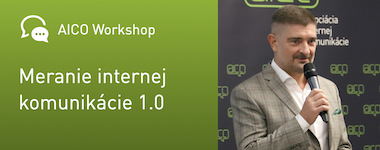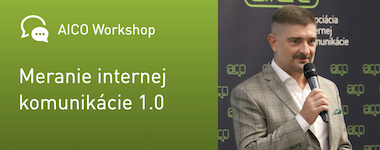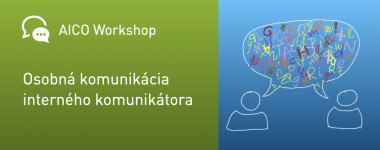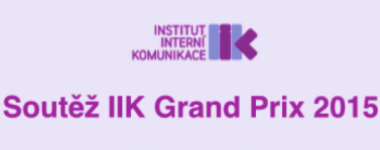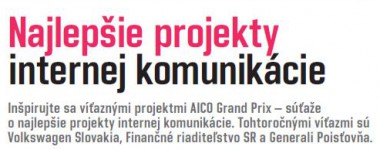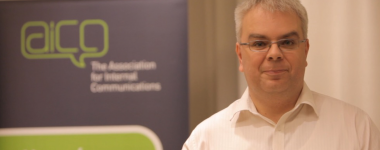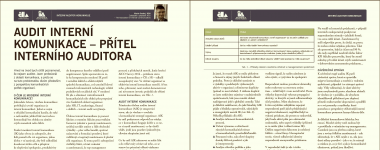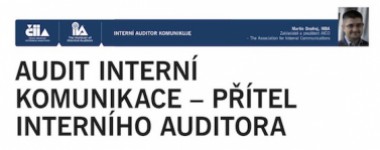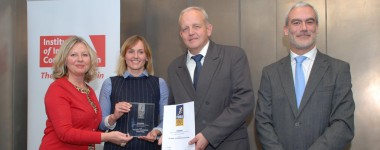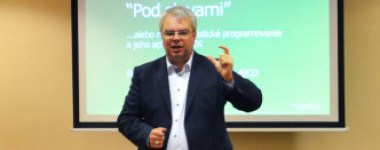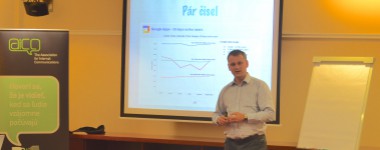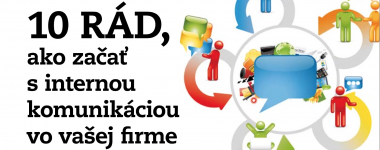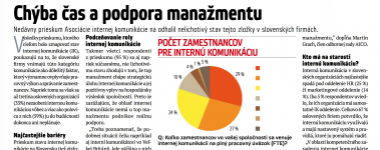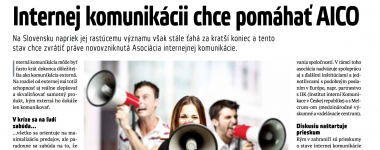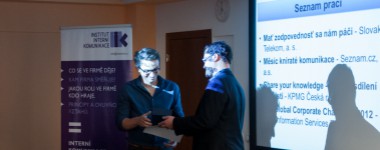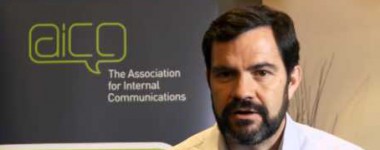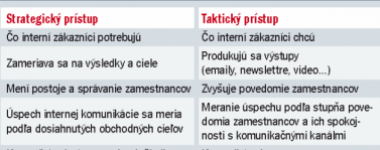IC around the world
IC around the world
november 2017
Členka odbornej rady AICO - Katarína Schneiderová (Head of Internal
Communications, Allianz) poskytla interview pre kanadský IC Kollectif -
globálnu neziskovú organizáciu venujúcu sa podpore internej komunikácie
so sídlom v Montreale.
Katka rozprávala o tom, ako sa interná komunikácia vyvýjala v posledných rokoch u nás, čo považuje za najväčšie výzvy a príležitosti pre IK, aké nástroje najčastejšie používa, či ktoré osobnosti v oblasti IK ju najviac inšpirujú. Celý rozhovor si môžete prečítať v angličtine nižšie.
IC AROUND THE WORLD
Views on internal communication from Slovakia
Interview with Katarina Schneiderova, Head of internal communication at Allianz
How has internal communication developed in your country in recent years?
I heard one joke during the crisis in 2008/2009: “How do you know that you work in an internal communication department? Your department is first to be dissolved.” It could be a joke but it reflected the real situation in Slovakia. Companies trying to decrease their expenses transferred their IC departments or functions to other departments such as HR or marketing where IC has a negligible role. In many Slovak companies, this situation still persists. I think that they should do exactly the opposite and strengthen the role of IC, as we know, that especially during turbulent times, effective IC is a must.
However, there are companies (most of them with an international background) that identified the strategic importance of IC in this fast-changing environment and of getting the new generation Y on board. Thus, I think there will be many more companies discussing the importance and need for IC. As a matter of fact, I can see it during my discussions with communication leaders associated with the Slovak Association of Internal Communication (AICO).
What do you currently see as the greatest challenges for internal communication in your world?
In my opinion, top management’s perception of internal communication is the key challenge. The role of communication is more than sending announcements, emails, newsletter publishing or updating the intranet. Management needs internal communication to achieve its vision and business goals. I think the quote by Bill Gates tells it perfectly: “Like a human being, a company has to have an internal communication mechanism, a “nervous system”, to coordinate its actions. “ I would add, an effective one. A company is just like the human body, when it feels healthy inside, it shows it outside as well.
Management needs to talk openly and frequently about the company vision, share its plan and involve employees to be a part of it. Talk to people, not have communicators to do that. Communication professionals are, to me, facilitators of discussions between stakeholders.
Measurement of IC projects is another challenge in Slovakia. It is very often underrated, but I am confident that only relevant feedback helps IC to evolve. Overall, numbers and data are something that management listens to, right? Therefore, communicators need to understand the importance of ROI in order to grab management’s attention, and thus have them pursue IC further within their organization.
Of course, there are many other challenges such as demographic changes, innovation in technology, change management issues.
What do you see as the biggest opportunities for internal communication to make a difference in the next year or two?
I am not sure, if in the next year or two, as everything happens and changes so fast - business environment, people, technology. I think that with the new generation of employees, companies need to adopt in their communication processes. Young employees prefer to get the information fast, they want to get involved and do it online.
Also, there are more strategic opportunities for internal communication considering demographic changes. After 1989, there was consecutive decrease of birth rate in Slovakia that culminated in years 2001 and 2003 . As a result, employees get older and we will skip a generation of employees. Companies should start to be prepared for the loss of human capital at a certain point and communicators should support management to cope with this issue. Demographic changes will bring a lot of challenges to all company functions.
Employees want to be involved in company projects, to be listened to. Therefore, management should be open to ongoing dialogue and feedback, to give employees the chance to help them to shape corporate culture and vision. I think to build or maintain mutual trust is a must. It is neither an easy, nor a quick process but one I believe will be reality in many organizations soon.
What internal communication resources (website, conferences, associations) do you make the most use of?
In 2013, the Association of Internal Communication in Slovakia was established to help communication professionals and companies develop the strategic role of IC within their organizations. To me, this is one of the best ways to discuss challenges and opportunities with peers, get inspiration and adopt positive changes in your own company. AICO organizes regularly conferences, seminars and workshops on IC with local but also international experts.
Also, the association annually organize a Grand Prix, a competition of IC projects. Winners are nominated to the European Grand Prix organized by European Association of Internal Communication (FEIEA). Being a part of a competition helps companies to get very useful feedback on their projects and IC activities, and encourages them to be better and better.
Also, I have attended few conferences organized by Quadriga University in Berlin. I found them very well organized and inspiring. Editor's Note: Their next internal communication conference is December 5-6, 2017.
Who are the internal comms experts and personalities you pay attention to the most?
I think AICO put together an interesting speaker panel at this year’s conference: http://www.internalcommunication.eu/sk/novinky/experti-z-oblasti-internej-komunikacie-o-jej-ulohach-a-vyzvach-vo-firemnom-prostredi.
Have you came across a piece of data - a study/report/research/case study/article - that proves your bosses/clients the value of IC investment generally, or to support a particular tactic or initiative?
I did, but unfortunately I can’t share exact data. I was lucky to work with companies that have fully supported IC. But still, I always have to bring final feedback/result of projects (numbers) to management. Measurement of project impact is underrated, as I mentioned above. IC projects are not measured by most of the companies in Slovakia. This is also a big challenge and opportunity for local organizations as well as for communication professionals. Because IC is not anymore only about design or tools but it is far more strategic.
Source: IC Kollectif, https://www.ickollectif.com/katarina-schneiderova
Views on internal communication from Slovakia
Interview with Katarina Schneiderova, Head of internal communication at Allianz
How has internal communication developed in your country in recent years?
I heard one joke during the crisis in 2008/2009: “How do you know that you work in an internal communication department? Your department is first to be dissolved.” It could be a joke but it reflected the real situation in Slovakia. Companies trying to decrease their expenses transferred their IC departments or functions to other departments such as HR or marketing where IC has a negligible role. In many Slovak companies, this situation still persists. I think that they should do exactly the opposite and strengthen the role of IC, as we know, that especially during turbulent times, effective IC is a must.
However, there are companies (most of them with an international background) that identified the strategic importance of IC in this fast-changing environment and of getting the new generation Y on board. Thus, I think there will be many more companies discussing the importance and need for IC. As a matter of fact, I can see it during my discussions with communication leaders associated with the Slovak Association of Internal Communication (AICO).
What do you currently see as the greatest challenges for internal communication in your world?
In my opinion, top management’s perception of internal communication is the key challenge. The role of communication is more than sending announcements, emails, newsletter publishing or updating the intranet. Management needs internal communication to achieve its vision and business goals. I think the quote by Bill Gates tells it perfectly: “Like a human being, a company has to have an internal communication mechanism, a “nervous system”, to coordinate its actions. “ I would add, an effective one. A company is just like the human body, when it feels healthy inside, it shows it outside as well.
Management needs to talk openly and frequently about the company vision, share its plan and involve employees to be a part of it. Talk to people, not have communicators to do that. Communication professionals are, to me, facilitators of discussions between stakeholders.
Measurement of IC projects is another challenge in Slovakia. It is very often underrated, but I am confident that only relevant feedback helps IC to evolve. Overall, numbers and data are something that management listens to, right? Therefore, communicators need to understand the importance of ROI in order to grab management’s attention, and thus have them pursue IC further within their organization.
Of course, there are many other challenges such as demographic changes, innovation in technology, change management issues.
What do you see as the biggest opportunities for internal communication to make a difference in the next year or two?
I am not sure, if in the next year or two, as everything happens and changes so fast - business environment, people, technology. I think that with the new generation of employees, companies need to adopt in their communication processes. Young employees prefer to get the information fast, they want to get involved and do it online.
Also, there are more strategic opportunities for internal communication considering demographic changes. After 1989, there was consecutive decrease of birth rate in Slovakia that culminated in years 2001 and 2003 . As a result, employees get older and we will skip a generation of employees. Companies should start to be prepared for the loss of human capital at a certain point and communicators should support management to cope with this issue. Demographic changes will bring a lot of challenges to all company functions.
Employees want to be involved in company projects, to be listened to. Therefore, management should be open to ongoing dialogue and feedback, to give employees the chance to help them to shape corporate culture and vision. I think to build or maintain mutual trust is a must. It is neither an easy, nor a quick process but one I believe will be reality in many organizations soon.
What internal communication resources (website, conferences, associations) do you make the most use of?
In 2013, the Association of Internal Communication in Slovakia was established to help communication professionals and companies develop the strategic role of IC within their organizations. To me, this is one of the best ways to discuss challenges and opportunities with peers, get inspiration and adopt positive changes in your own company. AICO organizes regularly conferences, seminars and workshops on IC with local but also international experts.
Also, the association annually organize a Grand Prix, a competition of IC projects. Winners are nominated to the European Grand Prix organized by European Association of Internal Communication (FEIEA). Being a part of a competition helps companies to get very useful feedback on their projects and IC activities, and encourages them to be better and better.
Also, I have attended few conferences organized by Quadriga University in Berlin. I found them very well organized and inspiring. Editor's Note: Their next internal communication conference is December 5-6, 2017.
Who are the internal comms experts and personalities you pay attention to the most?
I think AICO put together an interesting speaker panel at this year’s conference: http://www.internalcommunication.eu/sk/novinky/experti-z-oblasti-internej-komunikacie-o-jej-ulohach-a-vyzvach-vo-firemnom-prostredi.
Have you came across a piece of data - a study/report/research/case study/article - that proves your bosses/clients the value of IC investment generally, or to support a particular tactic or initiative?
I did, but unfortunately I can’t share exact data. I was lucky to work with companies that have fully supported IC. But still, I always have to bring final feedback/result of projects (numbers) to management. Measurement of project impact is underrated, as I mentioned above. IC projects are not measured by most of the companies in Slovakia. This is also a big challenge and opportunity for local organizations as well as for communication professionals. Because IC is not anymore only about design or tools but it is far more strategic.
Source: IC Kollectif, https://www.ickollectif.com/katarina-schneiderova









